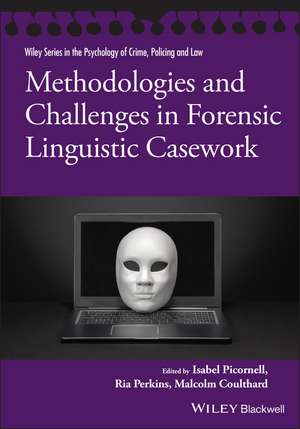Methodologies and Challenges in Forensic Linguistic Casework: Wiley Series in Psychology of Crime, Policing and Law
Autor R Perkinsen Limba Engleză Paperback – 13 apr 2022
Din seria Wiley Series in Psychology of Crime, Policing and Law
-
 Preț: 428.10 lei
Preț: 428.10 lei -
 Preț: 297.07 lei
Preț: 297.07 lei -
 Preț: 334.17 lei
Preț: 334.17 lei -
 Preț: 321.21 lei
Preț: 321.21 lei - 23%
 Preț: 627.49 lei
Preț: 627.49 lei - 8%
 Preț: 550.40 lei
Preț: 550.40 lei - 8%
 Preț: 579.35 lei
Preț: 579.35 lei - 8%
 Preț: 505.19 lei
Preț: 505.19 lei -
 Preț: 447.23 lei
Preț: 447.23 lei - 8%
 Preț: 619.67 lei
Preț: 619.67 lei -
 Preț: 356.70 lei
Preț: 356.70 lei -
 Preț: 290.23 lei
Preț: 290.23 lei - 5%
 Preț: 670.98 lei
Preț: 670.98 lei -
 Preț: 457.56 lei
Preț: 457.56 lei - 23%
 Preț: 539.22 lei
Preț: 539.22 lei -
 Preț: 517.55 lei
Preț: 517.55 lei - 23%
 Preț: 582.38 lei
Preț: 582.38 lei - 29%
 Preț: 314.99 lei
Preț: 314.99 lei - 29%
 Preț: 276.80 lei
Preț: 276.80 lei - 27%
 Preț: 243.93 lei
Preț: 243.93 lei
Preț: 335.27 lei
Nou
Puncte Express: 503
Preț estimativ în valută:
64.16€ • 68.60$ • 53.49£
64.16€ • 68.60$ • 53.49£
Carte disponibilă
Livrare economică 28 martie-11 aprilie
Livrare express 13-19 martie pentru 41.16 lei
Preluare comenzi: 021 569.72.76
Specificații
ISBN-13: 9781119614579
ISBN-10: 1119614570
Pagini: 192
Dimensiuni: 178 x 252 x 11 mm
Greutate: 0.59 kg
Editura: Wiley
Seria Wiley Series in Psychology of Crime, Policing and Law
Locul publicării:Chichester, United Kingdom
ISBN-10: 1119614570
Pagini: 192
Dimensiuni: 178 x 252 x 11 mm
Greutate: 0.59 kg
Editura: Wiley
Seria Wiley Series in Psychology of Crime, Policing and Law
Locul publicării:Chichester, United Kingdom
Notă biografică
Isabel Picornell, PhD, is a Visiting Research Fellow at the Aston Institute for Forensic Linguistics, UK. She is a certified Fraud Examiner and runs a forensic linguistic consultancy. Her main research interest is authorship in deceptive contexts. Ria Perkins, PhD, works as a civil servant for the Ministry of Defence, and is an Honorary Research Fellow at the Aston Institute for Forensic Linguistics in Birmingham, UK. Her casework specialty is authorship profiling, and her research interests include the language of persuasion and power, and Other Language Influence Detection (OLID). Malcolm Coulthard, PhD, is Emeritus Professor of Forensic Linguistics at Aston University, UK, where he founded the Centre for Forensic Linguistics. He was Foundation President of the International Association of Forensic Linguists and Founding Editor of the International Journal of Speech Language and the Law and Language and Law - Linguaegem e Direito.
